News
Sustainability a growing focus for global pet food brands
6 Apr 2023Pet food brands around the world are responding to consumer demands for sustainable pet food in many ways, from upcycled ingredients to carbon footprint claims and reduced-plastic packaging.
Increasingly aware of the environmental devastation caused by single-use plastic packaging, consumers are interested in products that are packaged in more sustainable and eco-friendly alternatives. This applies to both the food they buy for themselves and the petfood for their companions.

Ethical and environmental claims in the category have doubled in Europe in the past five years while 79% of Italian pet owners said they would like to know more about the eco footprint of different pet foods.
“Many consumers in Europe have become more knowledgeable of the ecological challenges that are facing the planet,” says Mintel. “[...] As a result, consumers are expecting brands to deliver meaningful ethical and environmental commitments and initiatives.
“Pet food brands in the region have stepped up efforts to address packaging waste by reducing material use and increasing recyclability. While carbon neutral claims remain niche in the category, brands are recognising growing consumer interest in the carbon footprint of the products they buy, and placing the information in a more prominent place on packaging.”
Such claims are more prevalent on wet and dry pet food products rather than snacks and treats, noted Mintel.
Carbon footprint labels and upcycled ingredients
One stand-out product launch is Edgard & Cooper’s complete adult cat food, which displays the carbon emissions on the front of the pack. Launched in the Netherlands, the product contains 50% fresh chicken meat sourced from free-range chickens and emits 2.2 kilos of CO2 per kilo of product.
Sustainable innovation in pet food is also happening at an ingredient level. In the US, the Portland Pet Food Company launched Bacon Brew biscuits dog treats that are made from upcycled brewer’s spent grain sourced from regional Northwest breweries.
“The intense competition in the pet food sector means that brands face an uphill battle to stand out and differentiate themselves. With the climate crisis increasingly on consumers' radars, brands can distinguish themselves from the competition by improving the climate footprint of their packaging,” wrote Mintel innovation analyst Mikolaj Kaczorowski.
Reduced-plastic and plastic-free packaging
Investing in sustainable pet food packaging could also resonate well in Latin America, according to the research firm. Sixty-two percent of adults in Colombia and Mexico say that environmentally friendly packaging is important to them when buying food and drink.
The number of pet food product launches in Latin America claiming to use environmentally friendly packaging rose modestly from 8% in 2018 to 14% in 2022, according to Mintel’s Global New Product Database.
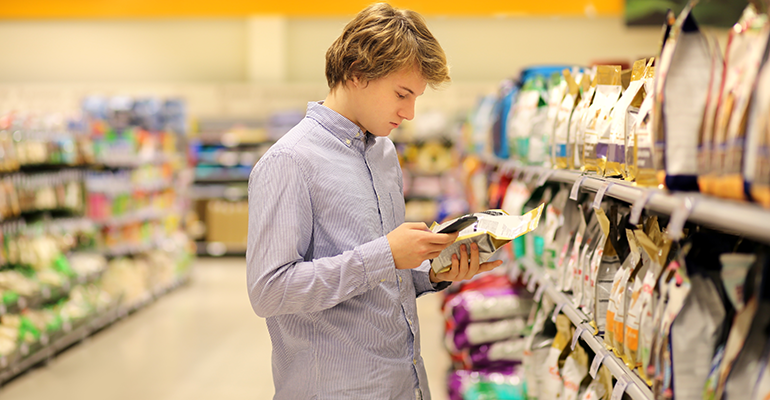 © AdobeStock/lado2016
© AdobeStock/lado2016
Brazilian brand Zee.dog, for example, launched a dog food product that is completely free from plastic packaging. Marketed as a complete meal for adult dogs, the chicken-based product is packaged in glass jars which are reusable and recyclable.
Panamanian brand Master Dog launched an indulgent snack for dogs – meat flavoured cookies – that come in a recyclable pack made with 25% less plastic.
Similar products are being launched in Asia. In Japan, Nestlé’s Purina repackaged Mon Petit Crispy Kiss chicken-based cat snack in a paper pack to reduce plastic waste, meaning the product now contains 66% less plastic than its previous iteration.
Don’t forget taste and nutrition
Just as with human food, however, consumers shopping for pet food prioritise taste and health over the efficacy of sustainable ingredients.
Companies must also therefore reassure pet owners of the taste and health benefits of any pet food products that are marketed as sustainable, rather than focusing solely on the planet-friendly credentials, noted Mintel food and drink director, Kate Vlietstra, in the recent Mintel report The Future of Pet Food: 2023.
Related news
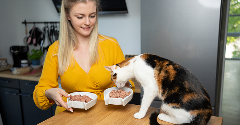
Lack of oversight in pet food could pose health risk to humans
22 Nov 2023
The pet food industry needs stricter health and safety standards, particularly as handling raw pet food can spread foodborne illnesses to humans, including Salmonella and Listeria, according to stakeholders.
Read more
Nestlé faces US lawsuit for allegedly false advertising pet food as ‘natural’
16 Nov 2023
Legal action has been brought against Nestlé Purina Petcare in the US, after various products were allegedly falsely marketed as ‘natural’, despite containing multiple synthetic ingredients.
Read more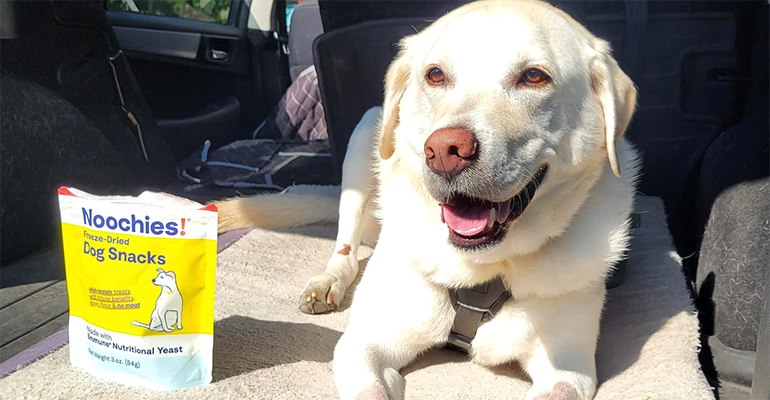
Healthy and humane: Noochies launches pet food that is factory farming-free
15 Sep 2023
US pet food brand Noochies uses nutritional yeast to make its meat-free, healthy dog food and freeze-dried snacks for cats and dogs – a humane pet food range that is free from factory farming meat, it says.
Read more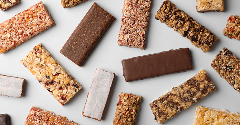
Insect protein market heats up in APAC region
12 Jun 2023
Packed with superfood-level nutritional benefits and with a neutral taste, Asian brands are using insect protein in finished products, such as Thailand’s Proothie, which makes cricket protein granola bars.
Read more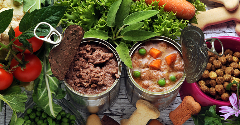
Plant-based could be the way forward in pet food
25 May 2023
Growing numbers of pet owners are choosing plant-based food for their pets for health and sustainability reasons, according to ProVeg, with many products containing healthy wholefood ingredients like kale, chia, beetroot, and broccoli.
Read more